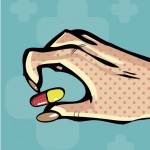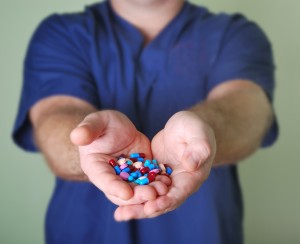
SSRIs are usually considered first-line treatment against major depression and approximately 50% of patients achieve remission with the drug they try first (Steffens, Krishnan, & Helms, 1997). However, every eighth case proves to be treatment-resistant and does not respond to standard antidepressant treatment at all. As a last resort, second-generation antipsychotics (SGAs) effective in schizophreniform disorders are sometimes prescribed as adjuvant antidepressant medication. However, there has been no systematic risk/benefit analysis to date and concerns have been raised because of serious side effects.
A meta-analysis by Spielmans et al. (2013) aims to closes this gap by providing a concise overview of efficacy and safety of SGAs as adjuvant treatment of major depression.
Methods

“Every eighth patient does not respond to antidepressants”
The authors scanned several medical databases for double-blind randomised controlled trials (RCTs) that assessed the effects of SGAs versus placebo in addition to first-line treatment with common antidepressants. Unpublished data was reviewed using online trial registries and US Food and Drug Administration (FDA) approval. Only SGAs that had received FDA approval (i.e. aripiprazole, olanzapine-fluoxetine combination OFC, quetiapine and risperidone) were considered. Treatment resistance was defined as having failed at least one antidepressant prior to enrolment. In total, 14 studies with 3,549 participants spanning 4 to 12 weeks of treatment met inclusion criteria. Publication bias was found, which is why the reported results are likely to be slightly inflated.
Symptom remission was defined as Montgomery-Asberg Depression Rating Scale (MADRS) ≤ 8 or Hamilton Depression Rating Scale (HAM-D) ≤ 7, respectively. These represent two of the most common self-rating measurement instruments for assessing depressive symptoms, where patients rate presence and severity of symptoms numerally. Response to antidepressants was conceptualized as at least 50% total score reduction on either measure. Because different measures of quality of life were assessed across primary studies, the authors calculated a pooled effect size. Adverse effects were aggregated into 7 categories, the most common being weight gain, abnormal metabolic laboratory results and sedation.
Results

All of the antipsychotics except risperidone caused significant side effects
Odds ratios (OR) and effect sizes (Hedges’ g) with 95% confidence intervals were reported, as well as the number needed to treat statistic (NNT). NNT basically indicates how many patients have to be treated with a certain medication on average in order to score one response superior to placebo (check Bandolier for further reading). Number needed to harm (NNH) provides a similar statistics for adverse effects.
All SGAs significantly improved remission rates:
- Aripiprazole (OR 2.01, CI 1.48-2.73, NNT 9)
- OFC (Olanzapine-Fluoxetine combination) (OR 1.42, CI 1.01-2.0, NNT 19)
- Quetiapine (OR 1.79, CI 1.33-2.42, NNT 9)
- Risperidone (OR 2.37, CI 1.31-4.30, NNT 9)
All SGAs except OFC significantly improved antidepressant response
All SGAs had a small significant effect on depression severity (mean g = 0.34)
All SGAs except risperidone caused significant adverse effects:
- Aripiprazole:
- Akathisia (NNH 4, CI 3-6)
- Sedation (NNH 14, CI 8-33)
- Weight gain (NNH 29, CI 10-119)
- OFC:
- Sedation (NNH 5, CI 3-12)
- Elevated prolactin (NNH 6, CI 4-11)
- Weight gain (NNH 9, CI 5-20)
- Abnormal metabolism (NNH 10, CI 5-29)
- Quetiapine:
- Sedation (NNH 3, CI 2-3)
- Abnormal metabolism (NNH 6, CI 4-9)
- Weight gain (NNH 37, CI 12-594)
Three SGAs either negligibly or non-significantly improved quality of life. Only risperidone yielded a small-to-moderate improvement (Hedges’ g = 0.49)
Conclusion
The authors conclude:
Atypical antipsychotic medications for the adjunctive treatment of depression are efficacious in reducing observer-rated depressive symptoms, but clinicians should interpret these findings cautiously in light of (1) the small-to moderate-sized benefits, (2) the lack of benefit with regards to quality of life or functional impairment, and (3) the abundant evidence of potential treatment-related harm.
Limitations

The results of this meta-analysis clearly question the use of second-generation antipsychotics as adjuvant medication in cases of treatment-resistant depression
Several points limit the scope of this meta-analysis. First, as Spielmans et al. note themselves, there was considerable variation among primary studies in terms of outcome measures. For instance, different depression rating scales or first-line antidepressants were used. Furthermore, included RCTs were of very short duration and therefore results cannot be extrapolated to long-term use. Because of pronounced side effects, it is also unlikely that primary studies were truly double-blind.
Summary
The results of this meta-analysis clearly question the use of second-generation antipsychotics as adjuvant medication in cases of treatment-resistant depression. Even though SGAs significantly reduce symptom severity, the overall quality of life does not seem to increase. This is likely due to the debilitating side effects of SGAs, such as weight gain, which Spielmans and colleagues diligently report. Taken together, these findings demand careful consideration on the physician’s part before prescription of SGAs to patients.
Links
Spielmans, G.L., Berman, M.I., Linardatos, E., Rosenlicht, N.Z., Perry, A., & Tsai, A.C. (2013). Adjunctive atypical antipsychotic treatment for major depressive disorder: a meta-analysis of depression, quality of life, and safety outcomes. PLoS Medicine, 10(3). doi:10.1371/journal.pmed.1001403
Steffens, D.C., Krishnan, K.R., & Helms, M.J. (1997). Are SSRIs better than TCAs? Comparison of SSRIs and TCAs: a meta-analysis. Depression and Anxiety, 6(1), 10-18. [PubMed abstract]


@Mental_Elf interesting, my life has been improved significantly by this. Often wonder if studies miss the ‘outliers’ who respond well.
Meta-analysis: efficacy & safety of 2nd generation antipsychotics as adjuvant treatment for major depression http://t.co/LoHrR6GoTD
Every 8th patient w/ depression does not respond to antidepressants, so should we try antipsychotics instead? http://t.co/LoHrR6GoTD
@Mental_Elf hope this systematic review is used to deter use of anti-psychotics. Emphasis needs to be placed on non-drug treatments
These studies compare antipsychotics to placebo not to antidepressants. No data that SGA better than SSRI @Mental_Elf http://t.co/9YTmBglNwI
If a person doesn’t respond to antidepressants should they be given antipsychotic medication instead?#mentalhealth http://t.co/GzjNDVE4AP
@Mental_Elf: “Every 8th patient w/ depression does not respond to antidepressants http://t.co/UBnwF30JuN” See this? http://t.co/Q7xftHe9T1
New @PLOSMedicine review: doctors shld think carefully before prescribing antipsychotics to ppl w/ depression http://t.co/LoHrR6GoTD
@Mental_Elf @plosmedicine Agreed!
@Mental_Elf Doctors should think carefully before prescribing antipsychotics. Full stop!
All #antipsychotics except #risperidone caused significant #SideEffects in treatment resistant #depression http://t.co/LoHrR6GoTD
@Mental_Elf please support me atypical antipsychotics like Olanzapine their needs be services monitoring weight.
http://t.co/rs87ywPSXL
Atypical antipsychotics don’t improve quality of life in treatment-resistant depression » The Mental Elf http://t.co/4IrbKddFqF
Atypical antipsychotics don’t improve quality of life in treatment-resistant depression. via The Mental Elf http://t.co/ZgO7U1Ah3Z